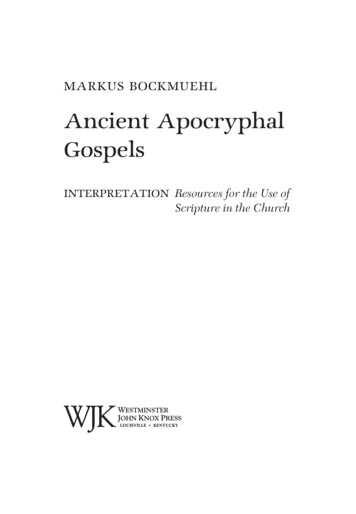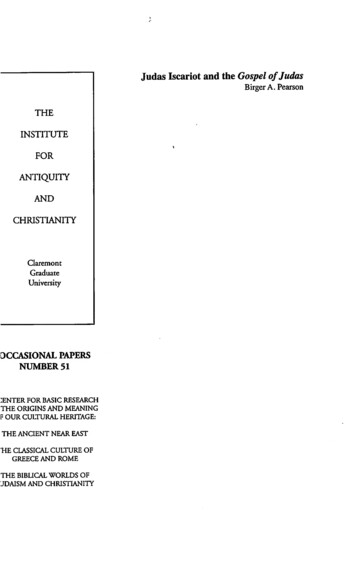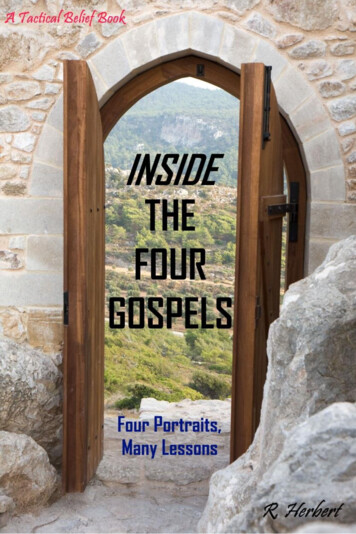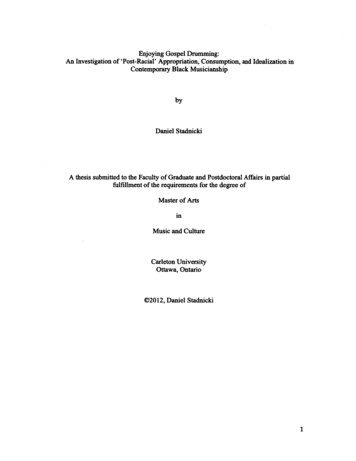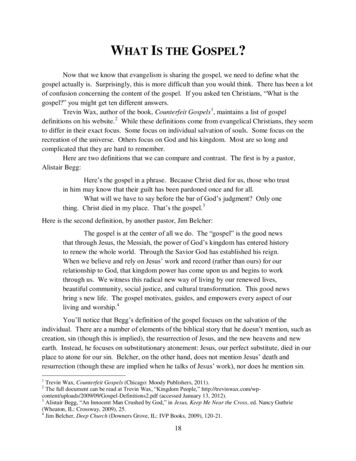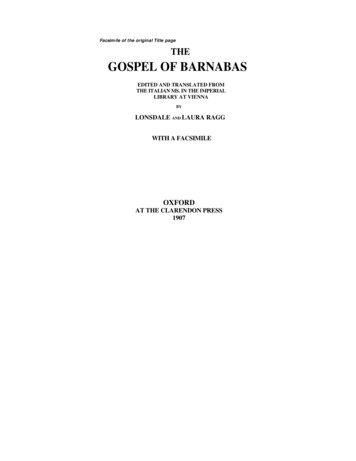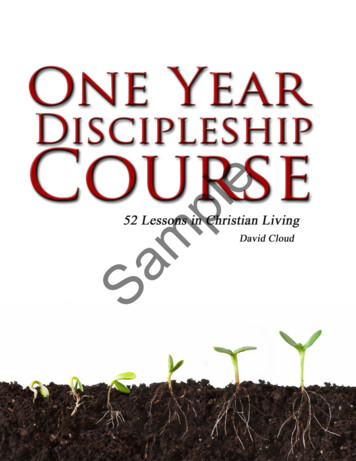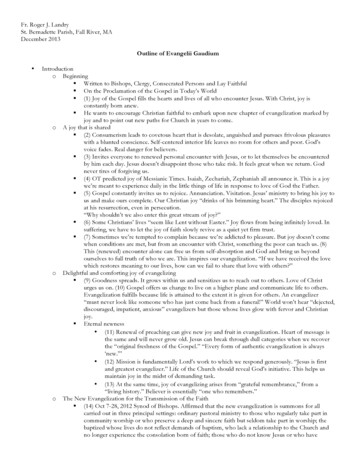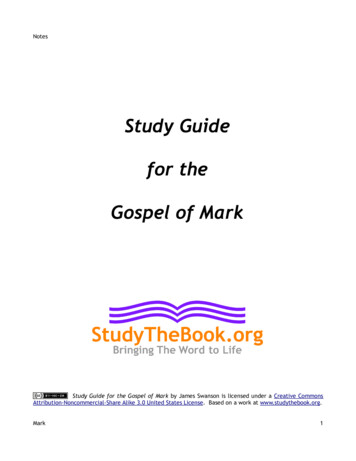
Transcription
The Gospel as Cen erD. A. CARSON (PhD, CambridgeUniversity) is research professor ofNew Testament at Trinity EvangelicalDivinity School. He has edited or written nearly sixty books, including TheCross and Christian Ministry.It’s timeto reclaim the coreof our beliefs Carson& KellerTIMOTHY KELLER (DMin, Westminster Theological Seminary) is founderand pastor of Redeemer PresbyterianChurch in New York. He is the bestselling author of The Prodigal God andThe Reason for God.U.S. 21.99PASTORAL RESOURCESTheGospelasCen erRenewingOur Faith andReformingOur MinistryPracticesEdited byD. A. Carson &Timothy KellerImportant aspects of Christianity arein danger of being muddied or lost asrelativism takes root in our churchestoday. What was historically agreedupon is now readily questioned, andthe very essentials of the Christianfaith are in jeopardy. It’s time to reclaimthe core of our beliefs.To that end, D. A. Carson, Tim Keller,Kevin DeYoung, Bryan Chapell, andother influential leaders have createdthis volume to defend the traditionalgospel and to strengthen the church.The Gospel as Center will help you joinin the movement—the movement dedicated to a Scripture-based reformationof ministry practices and the centralityof the gospel—and stand united underthe conviction that what holds us together is worth fighting for.
The Gospel as Center: Renewing Our Faith and Reforming Our Ministry PracticesCopyright 2012 by The Gospel CoalitionPublished by C rossway1300 Crescent StreetWheaton, Illinois 60187All rights reserved. No part of this publication may be reproduced, stored in a retrieval system, or transmitted in any form by any means, electronic, mechanical, photocopy, recording, or otherwise, without the prior permission of the publisher, except as provided for byUSA copyright law.Cover design: Matthew WahlFirst printing 2012Printed in the United States of AmericaScripture quotations marked esv are from the ESV Bible (The Holy Bible, English StandardVersion ), copyright 2001 by Crossway. Used by permission. All rights reserved.Scripture quotations marked kjv are from the King James Version of the Bible.Scripture quotations marked nasb are from The New American Standard Bible . Copyright The Lockman Foundation 1960, 1962, 1963, 1968, 1971, 1972, 1973, 1975, 1977, 1995.Used by permission.Scripture quotations marked niv are from The Holy Bible, New International Version ,NIV . Copyright 1973, 1978, 1984, 2011 by Biblica, Inc.ô Used by permission. All rightsreserved worldwide.Scripture quotations marked rsv are from The Revised Standard Version. Copyright 1946,1952, 1971, 1973 by the Division of Christian Education of the National Council of theChurches of Christ in the U.S.A.All emphases in Scripture quotations have been added by the authors.Hardcover ISBN: 978-1-4335-1561-3PDF ISBN: 978-1-4335-1562-0Mobipocket ISBN: 978-1-4335-1563-7ePub ISBN: 978-1-4335-1867-6Library of Congress Cataloging-in-Publication DataThe Gospel as center : renewing our faith and reforming our ministry practices / D. A. Carson and Timothy Keller, editors.p. cm.Includes bibliographical references and indexes.ISBN 978-1-4335-1561-3 (hc)1. Gospel Coalition. I. Carson, D. A. II. Keller, Timothy J., 1950–III. Gospel 2011026425Crossway is a publishing ministry of Good News 2121
Contents9Preface1 Gospel-Centered Ministry11D. A. Carson and Timothy Keller2 Can We Know the Truth?23Richard D. Phillips3 The Gospel and Scripture: How to Read the Bible41Mike Bullmore4 Creation55Andrew M. Davis5 Sin and the Fall77Reddit Andrews III6 The Plan89Colin S. Smith7 What Is the Gospel?115Bryan Chapell8 Christ’s Redemption135Sandy Willson9 Justification151Philip Graham Ryken10 The Holy Spirit171Kevin DeYoung11 The Kingdom of God191Stephen Um12 The Church: God’s New People209Tim Savage13 Baptism and the Lord’s SupperThabiti Anyabwile and J. Ligon Duncan231
14 The Restoration of All Things253Sam StormsAppendix: The Gospel Coalition Foundation Documents273Notes287General Index297Scripture Index303
PrefaceWhen The Gospel Coalition was founded, the members of the Councilworked hard to produce what we called our “Foundation Documents.”These consist of a one-page preamble, a statement of faith, and a theological vision of ministry. They are, we hope, full of God-centered joy,abounding in a delighted confidence in the gospel of Jesus Christ andits entailments for how we think and live. These documents are easilydownloadable, in several languages, from our website (thegospelcoalition.org) and can also be viewed in the appendix of this volume.It was not long before various local churches and organizationsasked to adopt them as their own, and of course we are always delightedwhen this takes place. Along with these requests came a rising numberof suggestions that we unpack the Foundation Documents in a series ofbooklets or downloadable files, eventually putting these together to formone book. So we asked a number of our Council members and one or twoothers to collaborate by writing fourteen chapters that explain the theology reflected in the Foundation Documents.The result is what you are holding in your hands. The individual chapters, available as booklets and files, have now come together in this book.We allowed some diversity in form while trying to maintain a moreor-less consistent level of accessibility. At the plenary sessions of ournational conferences, we have got used to expositors who vary enormously in their styles as they expound the Word of God; indeed, wedelight in the freshness of the diversity. Something of the same diversityis reflected in these chapters, and we are grateful for it.Once again I am deeply indebted to Andy Naselli who helped with theediting and the indexes. Crossway’s collaboration in this project has beencharacterized by their usual patience, competence, and courtesy.— D. A. CarsonThe Gospel Coalition9
1Gospel-CenteredMinistryD. A. Carson and Timothy KellerThe Gospel Coalition is a fellowship of churches and Christians frommany different denominations that are united not only by belief in thebiblical gospel but also by the conviction that gospel-centered ministrytoday must be strengthened, encouraged, and advanced. What followsgives a bit of the history of how and why we have come together.Several years ago a number of us began to meet together annually.That group became The Gospel Coalition’s Council. For the first threeyears we sought to do two things.The Confessional FoundationFirst, we sought to identify and strengthen the center of confessionalevangelicalism. We believe that some important aspects of the historicunderstanding of the biblical gospel are in danger of being muddied orlost in our churches today. These include the necessity of the new birth,justification by faith alone, and atonement through propitiation and thesubstitutionary death of Christ. We sought to maintain and strengthenour hold on these doctrines, not merely by citing the great theologicalformulations of the past but also through continued, fresh interactionwith the Scripture itself, and so we worked together to produce The Gospel Coalition’s Confessional Statement.Biblical-Theological CategoriesMany members told me afterward that working on the ConfessionalStatement was one of the most edifying and instructional experiences11
The Gospel as Centerthey had ever had. About four dozen experienced pastors worked it overline by line. One of our goals was to draw our language as much from theBible as possible rather than to resort too quickly to the vocabulary ofsystematic theology. Systematics is crucial, and terms such as the Trinity,which are not found in the Bible itself, are irreplaceable for understanding and expressing large swaths of the Bible’s teaching. Nevertheless, tomaintain unity among ourselves and to persuade our readers, we soughtto express our faith as much as possible in biblical-theological categories rather than drawing on the terminology of any particular tradition’ssystematic theology.Beginning with GodWe also thought it was important to begin our confession with Godrather than with Scripture. This is significant. The Enlightenment wasoverconfident about human rationality. Some strands of it assumed itwas possible to build systems of thought on unassailable foundationsthat could be absolutely certain to unaided human reason. Despite theirfrequent vilification of the Enlightenment, many conservative evangelicals have nevertheless been shaped by it. This can be seen in how manyevangelical statements of faith start with the Scripture, not with God.They proceed from Scripture to doctrine through rigorous exegesis inorder to build (what they consider) an absolutely sure, guaranteed-trueto-Scripture theology.The problem is that this is essentially a foundationalist approach toknowledge. It ignores the degree to which our cultural location affectsour interpretation of the Bible, and it assumes a very rigid subject-objectdistinction. It ignores historical theology, philosophy, and cultural reflection. Starting with the Scripture leads readers to the overconfidence thattheir exegesis of biblical texts has produced a system of perfect doctrinaltruth.1 This can create pride and rigidity because it may not sufficientlyacknowledge the fallenness of human reason.We believe it is best to start with God, to declare (with John Calvin,Institutes 1.1) that without knowledge of God we cannot know ourselves,our world, or anything else. If there is no God, we would have no reasonto trust our reason.12
Gospel-Centered MinistryEvangelicalAlso, as part of this process, we gave some time to the question, “Is theterm evangelical useful anymore?” A good case can be made for the position that it is not. Within the church, the word conveys less and lesstheological content. The word almost means “all who are willing to usethe term ‘born again’ to describe their experiences.” Outside the church,the word has perhaps the most negative connotations it has ever had.Nevertheless, the term describes our churches and association.Why? We come from different denominations and traditions—Baptist,Presbyterian, Episcopalian, and charismatic, to name the larger groupings. We do not think the distinctives of theology and ecclesiology thatdivide us are insignificant—not at all. They shape our ministries and differentiate us in many important ways. (One could say “complementary”ways, but that would be another essay.) However, we are united by theconviction that what unites us—the doctrinal core components of thegospel—is far more important than what divides us. On the one hand,that conviction differentiates us from those who believe that there isno gospel to preach apart from the distinctions of their tradition. Theydo not think that their denominational distinctives are “secondary.” Onthe other hand, that conviction differentiates us from those who wouldrather define evangelicalism only in sociological or experiential termsand who would therefore not make such a robust doctrinal confessionalstatement the basis for fellowship and cooperation.So we continue to use the important term evangelical to describeourselves, often adding the word confessional to it to denote the moretheologically enriched vision of evangelicalism that we hold.The Vision for MinistryWe have not united, however, merely to defend traditional gospel formulations. Our second purpose was to describe, support, and embodygospel-centered ministry today.Changes in Our WorldMany younger leaders in our churches are reeling from the changes theysee in our world. Until a generation ago in the United States, most adultshad similar moral intuitions, whether they were born-again believers,13
The Gospel as Centerchurchgoers, nominal Christians, or unbelievers. All that has changed.Secularism is much more aggressive and anti-Christian; the society ingeneral is coarsening; and the moral intuitions of younger people radically vary from their more traditional parents.Many have called this new condition the “postmodern turn,” thoughothers call our situation “late” modernity, or even “liquid” modernity.Modernity overturned the authority of tradition, revelation, or anyauthority outside of the internal reason and experience of the self. Yetfor a long time, relatively stable institutions continued to dominate contemporary society. People still rooted their identities to a great degree infamily, local communities, and their work or vocation. That seems to bepassing.The “acid” of the modern principle—the autonomous, individualself—seems to have eaten away all stable identities. Marriage and family, workplace and career, neighborhood and civic community, politicsand causes—none of these institutions now remain stable long enoughfor individuals to depend on them. People now live fragmented lives, nolonger thinking of themselves in terms of a couple of basic roles (e.g.,Christian, father, and lawyer). Instead, their identity constantly shapeshifts as they move through a series of life episodes that are not tightlyconnected. They are always ready to change direction and abandon commitments and loyalties without qualms and to pursue—on a cost-benefitbasis—the best opportunity available to them.Responding to Changes in Our WorldIn the past, many of our neighbors could understand traditional evangelical preaching and ministry, but they met it with disagreement or indifference. During the last fifteen years, people have increasingly metit with completely dumbfounded incomprehension or outrage. TheAmerican evangelical world has been breaking apart with wildly different responses to this new cultural situation. To oversimplify, some havesimply built the fortress walls higher, merely continuing to do what theyhave always done, only more defiantly than before. Others have called fora complete doctrinal reengineering of evangelicalism. We think both ofthese approaches are wrong-headed and, worse, damaging to the causeof the gospel.14
Gospel-Centered MinistryPreaching. Here is one example. Over the last few years there hasbeen a major push to abandon expository preaching for what is looselycalled “narrative” preaching. The diagnosis goes something like this:These are postmodern times, marked by the collapse of confidence inthe Enlightenment project and a rational certainty about “truth.” Sonow hearers are more intuitive than logical; they are reached morethrough images and stories than through propositions and principles.They are also allergic to authoritarian declarations. We must adapt tothe less rational, nonauthoritarian, narrative-hungry sensibilities ofour time.In our understanding, it is a great mistake to jettison expositorypreaching in this way. But in some quarters, the response goes somethinglike this: “Because postmodern people don’t like our kind of preaching,we are going to give them more of it than ever.” They are unwilling to admitthat much conventional use of the expository method has tended to bepretty abstract, quite wooden, and not related to life. It is also true thatmany traditional expository preachers like the “neatness” of preachingthrough the Epistles instead of the vivid visions and narratives of the OldTestament. But most importantly, expository preaching fails if it does nottie every text, even the most discursive, into the great story of the gospeland mission of Jesus Christ.Justice and Ministry to the Poor. Another example is the issueof justice and ministry to the poor. Many young Christian leaders whoare passionate about social justice complain that the classic reading ofthe book of Romans by Augustine, Luther, and Calvin is mistaken. Theysay that Jesus did not bear God’s wrath on the cross, but instead exemplified service and love rather than power and exploitation and therefore“defeated the powers” of the world. The gospel of justification, in thisview, is not so much about reconciling God and sinners as about including the marginal in the people of God. In other words, they believe thatif Christians are going to leave their comfort zones and minister to andadvocate for the poor and marginalized of the world, we must deconstruct traditional evangelical doctrine.All this rightly alarms many conservative Christian leaders, but somewrongly conclude that those who are strongly concerned to minister tothe poor must abandon traditional Christian doctrine. Neither group is15
The Gospel as Centerright. You do not have to change classic, traditional Christian doctrine toemphasize that ministering to the poor is important.2 Jonathan Edwards,who is hardly anyone’s idea of a “liberal,” concluded, “Where have weany command in the Bible laid down in stronger terms, and in a moreperemptory urgent manner, than the command of giving to the poor?”3Edwards saw a concern for the poor that was rooted not only in a doctrineof creation and the imago Dei but also in the doctrine of the substitutionary death of Christ and justification by faith alone.Since Jesus had to die to appease the wrath of God, we know that Godis a God of justice, and therefore we should be highly sensitive to therights of the poor in our communities. They should not be mistreatedbecause of their lack of economic power. And because we were spirituallybankrupt and received the riches of Christ undeserved, we should neverlook down on the poor and feel superior to the economically bankrupt.We should be willing to give our funds even to the “undeserving poor”since we are the spiritually undeserving poor who receive the free mercyof God. Edwards argues powerfully and tirelessly for ministry to the poorfrom classic evangelical doctrines.4Gospel-Centered Ministry TodayThe Gospel Coalition is united by the belief that we must not ignore ourcontext and setting, and we must seriously reflect upon our culture sothat our gospel-ministry engages and connects with our culture. This iswhy we developed the Theological Vision for Ministry, which concludesthat the gospel shouldproduce churches filled with winsome and theologically substantialpreaching, dynamic evangelism and apologetics, and church growthand church planting. They will emphasize repentance, personal renewal, and holiness of life. At the same time, and in the same congregations,there will be engagement with the social structures of ordinary people,and cultural engagement with art, business, scholarship, and government. There will be calls for radical Christian community in which allmembers share wealth and resources and make room for the poor andmarginalized. These priorities will all be combined and will mutuallystrengthen one another in each local church.So we in The Gospel Coalition believe that the gospel must always be16
Gospel-Centered Ministrydefended and that one irreplaceable way to do that is to show the worldand the church the power of a gospel-centered ministry. The best way todefine and defend the gospel is to love, believe, embody, and propagateit. In our Confessional Statement, the Vision for Ministry, and The Gospelfor All of Life, we map out some of the basic features of what a gospelcentered ministry should look like today in Western culture.During the first three years of our walk together, we sought to unitea diverse group of people around this gospel center. Our meetings wereprovocative and exciting because they were not dominated by one theological tradition or by a couple of dominant personalities. And as we gavetime to these issues, we grew to trust each other more and more and cameto greater unity of mind and heart.Prophetic from the CenterMore recently, The Gospel Coalition has moved into a new phase of ministry, and the most visible parts are our national conference, website,and TGC Network. But these are just means to being “prophetic from thecenter.”The evangelical “tent” is bigger and more incoherent than ever. As wehave noted, one of the main causes of this is the fast-changing Westernculture we find ourselves in. One could argue that it is a much more difficult environment in which to minister than Greco-Roman paganism,largely because it is post-Christian, not pre-Christian. Because of thischallenge, the Christian church is splintering and fragmenting. There areat least three types of responses, what James Hunter has called “PurityFrom,” “Defensive Against,” and “Relevant To.”5“Purity From” responses are found among the Christians andchurches that think we can have no real impact on culture, that all effortsto influence culture merely pollute and compromise us. By “DefensiveAgainst” Hunter refers to those believers who think we can change culture through politics or through getting control of elite institutions andwielding their power. By “Relevant To” he designates many mainline,“emergent,” and mega-churches that think we can change culture mainlyby becoming more compassionate, less combative, and more contextual,thereby winning enough individuals back into the church to make adifference in the culture. Ironically, all of these approaches are still too17
The Gospel as Centerinfluenced by our “Christendom” past. Even the “Purity From” party, withits strong denunciation of Christendom, is like a man who is so violentlycommitted to being unlike his father that his father is still basically controlling his behavior.What does it mean to be “prophetic” from the center? It means tocenter our churches on the gospel, thereby producing a series of balancesthat the other approaches do not have. We should be neither separatistnor triumphalistic in relationship to our culture. Believers (not localchurches qua churches) should seek both to inhabit the older culturalinstitutions and to set up new, innovative institutions and networks thatwork for the common good on the basis of Christian understandings ofthings.In our gospel communication, we should neither ignore baseline cultural narratives nor just change the packaging and call that “contextualizing.” We should stand for the irreplaceability of the local church, whichhas the task of evangelizing and discipling. But we should also encourageChristians to work in the world as salt and light. All these balances, webelieve, flow out of a profound grasp of the meaning of the gospel for allof life.The priority we give to the gospel of Jesus Christ may not immediatelyseem warranted to those who entertain a different view of what “gospel”means. At least two constraints are commonly imposed on the word.First, some think of the gospel as one important but relatively small partof the Bible’s content. Second, others think of the gospel as what tipsus into the kingdom and gets us “saved,” while the life-transformingelements in the Bible’s content are bound up with something rather different—wisdom, law, counsel, narrative paradigms, and small-grouptherapy, but not gospel.The response comes in two parts.Biblical Theology Flowing toward Jesus and the GospelThe first part is that biblical theology, rightly understood, flows throughthe Bible toward Jesus and the gospel, which fulfills all the revelationleading up to it, gathering all the strands of biblical thought into itself.Of course, there are irresponsible and misleading brands of biblical theology, just as there are irresponsible and misleading brands of system18
Gospel-Centered Ministryatic theology. The last thing we want is to extol the virtues of one of thesetwo disciplines while emphasizing the weaknesses of the other, for bothdisciplines at their best bring great strengths to faithful biblical understanding and living.6 At their best, both disciplines aim, in their handling of Scripture, to be sensitive to the Bible’s different literary genres,not least the various ways the different genres make their appeals (compare, for instance, law, narrative, and wisdom literature).By and large, however, systematic theology asks and answers atemporal questions. For example: What are the attributes of God? What did thecross achieve? What is sin? Because it aims to synthesize all of Scriptureand to interact with the broadest questions, the categories it uses musttranscend the usage of individual biblical books or writers. For instance,systematicians speak of the doctrine of justification, knowing full wellthat the justification word-group does not function exactly the same wayin Matthew as it does in Paul; they speak of the doctrine of the call of God,where exactly the same observation about “call” language must be made.In other words, the theological words and categories that systematictheology deploys often formally overlap with biblical usage, but they maymaterially draw their meaning from just one biblical writer. Further, thequestion, “What are the attributes of God?” is both clear and important,but the fact remains that no biblical book speaks of the attributes of God.All readers of systematic theology understand these givens.By contrast, biblical theology, by and large, asks and answers questions that focus on the contributions and themes of particular biblicalbooks and corpora as these books and corpora are stretched out acrossthe timeline of redemptive history. As much as possible, the categoriesused are the categories found within the biblical materials themselves.So now we are asking and answering questions of two kinds. (1) What arethe themes of Genesis (or Ecclesiastes, Luke, or Romans)? How is the bookput together? What does it teach us about the subjects it addresses? Whatdoes Isaiah, say, teach us about God? (2) How do these themes fit into theBible’s storyline at their respective points in the history of redemptionand take the unfolding revelation forward to Jesus Christ? What are theunfolding patterns, the trajectories that reach back to creation and forward to Jesus and on to the consummation?The Council members of The Gospel Coalition want to encourage the19
The Gospel as Centerkind of reading and preaching of the Bible that traces out these trajectories so that Christians can see how faithfully and insightfully readingScripture follows the patterns and promises of the Bible to take us towardJesus and his gospel. For instance, we cannot deal with what Genesis saysabout creation as if it were mere datum or mere sanction for ecologicalresponsibility or mere establishment of our embodied existence, thoughall those things are true and have some importance. Within Genesis,creation grounds the responsibility of God’s image bearers toward Godand sets the stage for the anarchy and idolatry of Genesis 3 that in turnproduces the drama of the entire Bible.Ultimately, the hope of the condemned human race is in the seedof the woman, who comes and engages in a new creation, which culminates in a new heaven and a new earth. Already in Genesis 1–2, however,temple symbolism is bound up with the description of the creation andits garden, which establishes a related trajectory through the Bible: tabernacle and temple, with their priestly and sacrificial systems, interwovenwith the fall of the temple at the onset of the exile and the constructionof a second temple decades later, rushing toward Jesus’ insistence thathe himself is the temple, the great meeting place between God and sinfulhuman beings (John 2:19–22).Along a slightly adjacent trajectory, the church is God’s temple. Inthe culminating vision, the “new Jerusalem” contains no temple, for theLord God Almighty and the Lamb are its temple (Rev. 21:22). Meanwhilethe symbolism inherent in the garden of Eden (Genesis 2) is itself pickedup and utilized in the culminating vision—but only after Christ himselfhas passed through a quite different garden, the garden of Gethsemane,to secure the better garden for us. It would be easy to follow these andmany other lines as they intertwine to make an entrancing weave of God’spurposes in bringing us to Jesus Christ and his gospel.That brings us to the second part of our response to those who have atruncated view of what the gospel is.Christian Life and Thought Flowing from Jesus and His GospelNot only does the gospel of Jesus Christ gather into itself all the trajectories of Scripture, but under the terms of the new covenant, all of Christian life and thought grow out of what Jesus has accomplished. This20
Gospel-Centered Ministrygood news not only declares that God justifies sinners so that our status before him is secured but also that he regenerates us and establishesus in his saving kingdom. The gospel deals with more than the judicial,our standing before God, for it is the power of God that brings salvation(Rom. 1:18)—a comprehensive transformation. Everything is securedby Jesus’ death and resurrection; everything is empowered by the Spirit,whom he bequeaths; everything unfolds as God himself has ordainedthis great salvation.Especially telling are the motive clauses that underlie Christian ethics. We forgive others because we ourselves have been forgiven (Col. 3:13;Matt. 6:12–15; Mark 11:25). We walk in humility because no one hasever displayed more humility than our Savior in abandoning his rights asGod and dying our death (Phil. 2:3–8). We hunger to live out the love ondisplay among the persons of the Godhead because it was out of love thatthe Father determined that all should honor the Son even as they honorthe Father, and because it was out of love for his Father that the Son wentto the cross to do his Father’s will (John 5:20, 23; 14:30–31). Our ultimate model for husband-wife relationships is predicated on the gospel:the bond between Christ and the church (Eph. 5:22–33). We hunger forthe holiness without which no one will see the Lord, because the HolyOne has not only established our status before his Father but is at work tomake us holy (Heb. 12:14; Phil. 2:12–13).As all the wretched malice of assorted idolatries and transgressions isprecisely what the gospel of Christ overcomes, we hunger to live as Jesuslived, our Savior and Lord, living another way in our individual lives,
TIMOTHY KELLER (DMin, Westmin-ster Theological Seminary) is founder and pastor of Redeemer Presbyterian Church in New York. He is the best-selling author of . The Prodigal God. and . The Reason for God. PASTORAL RESOURCES. U.S. 21.99. It’s time . to reclaim the core of our beliefs The Gospel as C en e r.
